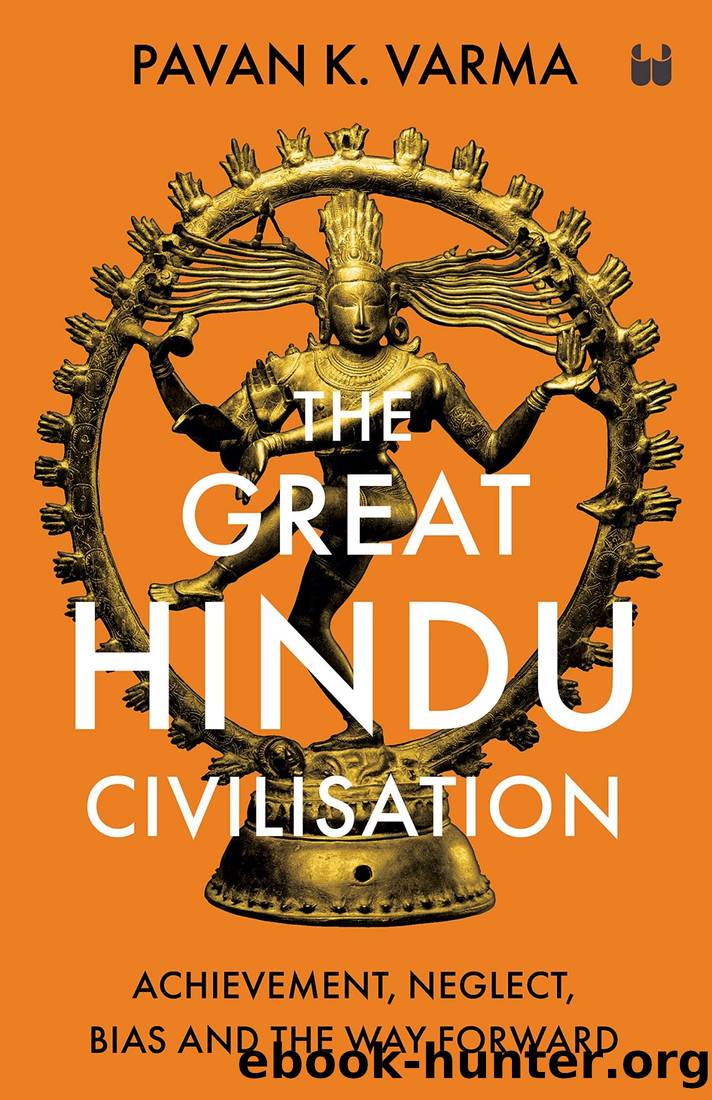The Great Hindu Civilisation: Achievement, Neglect, Bias and The Way Forward by Pavan K. Varma

Author:Pavan K. Varma [Varma, Pavan K.]
Language: eng
Format: epub
ISBN: 9789390679966
Google: jiObzgEACAAJ
Amazon: 9390679966
Publisher: Westland
Published: 2021-01-14T18:30:00+00:00
4
THE ISLAMIC CONQUEST
The conquest of India by foreigners, starting with the seventeen invasions of Mahmud Ghazni (r. 1001â1025 CE), and the subsequent establishment of the Ghurid empire in Delhi under Mohammad Ghori in 1202 CE, left Hindu India physically destroyed and psychologically traumatised. Earlier, invaders like the Greeks led by Alexander conquered the northernmost areas in the fourth century BCE, and following his death, a series of subsidiary Greek invasions continued for the next 400 years. In 57 BCE, the Sakas, a foreign tribe from Central Asia, also made their entry, albeit briefly. These invasions and conquests saw subjugation and loss of lives. But the Hindu civilisation had never seen conquerors like the Islamic Turkic invaders, who were so blindly committed to the destruction of a culture, so fanatically driven by a belief in the superiority of their religion, so unrelenting in their hatred for those not belonging to it and so passionate about the need to convert the unbelievers.
The purpose in saying this is not to excavate history to create acrimonies in the present, but to be truthful to history. There has been, especially after 1947, a concerted, organised and deceitful attempt to gloss over the facts of history in the false belief that this will be in the interest of preserving secularism in India. However, we are now seeing a backlash against this dishonesty. The truth about what actually happened needs to be accepted in order to go beyond it, towards the imperatives of strengthening our multireligious and plural republic.
It would be useful to examine some of the arguments given to falsely underplay the magnitude of destruction and violence of the Islamic conquerors. Marxist historians have asserted that Muslims did not wreak havoc and plunder, but that Hindus themselves preferred the egalitarianism guaranteed by the Shariat to the social discrimination of the Smritis. This is simply untenable. There was no question of a democratic choice being given to the conquered Hindus. The invaders believed that they were the chosen ones, the believers, and that those who were not were kafirs, unbelievers, beyond the pale. The territory of the kafirs was dubbed Dar-al-Harb, a place that needed to be conquered by the sword to make it Dar-al-Islam, the land of Islam. There was, indeed, social oppression in Hindu society in the form of the caste system, and I have acknowledged this earlier, but it is an absurd quantum jump of illogic to conclude from this that Hindus were willing to en masse and happily convert to Islam, or volitionally choose to support those who broke their temples, pillaged their homes, ruthlessly killed them and destroyed their culture.
Motivated apologists have other unconvincing theories also. One of these, propounded by the late Professor Mohammad Habib of the Aligarh Muslim University, sought to extenuate the extent of savagery by arguing that it was motivated by the âlust for plunderâ, which any conqueror would display. In his book, Sultan Mahmud of Ghaznin, first published in 1924, he discounted, therefore, the repeated destruction of Hindu temples.
Download
This site does not store any files on its server. We only index and link to content provided by other sites. Please contact the content providers to delete copyright contents if any and email us, we'll remove relevant links or contents immediately.
| Chakras | Gandhi |
| History | Rituals & Practice |
| Sacred Writings | Sutras |
| Theology |
Fingersmith by Sarah Waters(2532)
Kundalini by Gopi Krishna(2180)
Wheels of Life by Anodea Judith(2144)
Indian Mythology by Devdutt Pattanaik(1936)
The Bhagavad Gita by Bibek Debroy(1929)
The Yoga of Jesus: Understanding the Hidden Teachings of the Gospels by Paramahansa Yogananda(1849)
Autobiography of a Yogi (Complete Edition) by Yogananda Paramahansa(1824)
The Man from the Egg by Sudha Murty(1812)
The Book of Secrets: 112 Meditations to Discover the Mystery Within by Osho(1670)
Chakra Mantra Magick by Kadmon Baal(1638)
The Sparsholt Affair by Alan Hollinghurst(1585)
Sparks of Divinity by B. K. S. Iyengar(1531)
Gandhi by Ramachandra Guha(1528)
Avatar of Night by Tal Brooke(1519)
Karma-Yoga and Bhakti-Yoga by Swami Vivekananda(1491)
The Bhagavad Gita (Classics of Indian Spirituality) by Eknath Easwaran(1485)
The Spiritual Teaching of Ramana Maharshi by Ramana Maharshi(1428)
Hindoo Holiday by J. R. Ackerley(1376)
Hinduism: A Very Short Introduction (Very Short Introductions) by Knott Kim(1373)
